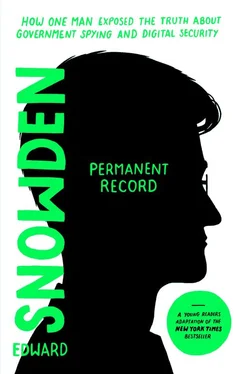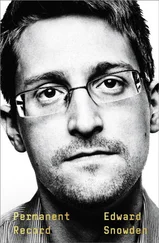I don’t remember high school very well because I’d spent so much of it asleep, compensating for all my insomniac nights on the computer. At Arundel High, most of my teachers didn’t mind my little napping habit and left me alone so long as I wasn’t snoring, though there were still a cruel, joyless few who considered it their duty to always wake me with a question: “And what do you think, Mr. Snowden?”
I’d lift my head off my desk, sit up in my chair, yawn, and—as my classmates tried to stifle their laughter—have to answer.
The truth is, I loved these moments, which were among the greatest challenges high school had to offer. I loved being put on the spot, groggy and dazed, with thirty pairs of eyes and ears trained on me and expecting my failure while I searched for a clue on the half-empty blackboard. If I could think quickly enough to come up with a good answer, I’d be a legend. But if I was too slow, I could always crack a joke—it’s never too late for a joke. In the absolute worst case, I’d sputter, and my classmates would think I was stupid. Let them. You should always let people underestimate you. Because when people misappraise your intelligence and abilities, they’re merely pointing out their own vulnerabilities—the gaping holes in their judgment that need to stay open if you want to cartwheel through later on a flaming horse, correcting the record with your sword of justice.
At the time, I believed that life’s most important questions were binary, meaning that one answer was always Right, and all the rest were Wrong. I think I was enchanted by the model of computer programming, whose questions can only be answered in one of two ways: 1 or 0, the machine-code version of yes or no, true or false. Even the multiple-choice questions of my quizzes and tests could be approached through binary logic. If I didn’t immediately recognize one of the possible answers as correct, I could always try to reduce my choices by a process of elimination.
Toward the end of my freshman year, however, I was faced with a very different kind of assignment—a question that couldn’t be answered by filling in bubbles with a number-two pencil. It was an English class assignment, a writing prompt: “Please produce an autobiographical statement of no fewer than 1,000 words.” I was being ordered to divulge my thoughts on perhaps the only subject on which I didn’t have any thoughts: the subject of me. I just couldn’t do it. I didn’t turn anything in and received an incomplete.
My problem, like the prompt itself, was personal—my family was falling apart. My parents were getting a divorce. It all happened so fast. My father moved out, and my mother moved us into a condominium in a development in nearby Ellicott City. As the custody and visitation rights were being sorted, my sister threw herself into college applications.
I reacted by turning inward. Among family, I was dependable and sincere. Among friends, cheery and unconcerned. But when I was alone, I was constantly worried about being a burden. Every fuss I’d ever made flickered in my mind, evidence that I was responsible for what had happened between my parents.
I started faking self-sufficiency, projecting a sort of premature adulthood. I stopped saying that I was “playing” with the computer and started saying that I was “working” on it. Just changing those words, without remotely changing what I was doing, made a difference in how I was perceived, by others and even by myself.
I stopped calling myself Eddie. From now on, I was Ed. I got my first cell phone, which I wore clipped to my belt like a grown-up.
I was surprised to find that as I put more and more distance between myself and my parents, I became closer to others, who treated me like a peer. Mentors who taught me to sail, trained me to fight, coached me in public speaking, and gave me the confidence to stand onstage—all of them helped to raise me.
At the beginning of my sophomore year, though, I started getting tired a lot and falling asleep more than usual—not just at school anymore, but now even at the computer. Soon enough my joints were aching, my nodes were swollen, the whites of my eyes turned yellow, and I was too exhausted to get out of bed, even after sleeping for twelve hours or more at a stretch.
I was eventually diagnosed with infectious mononucleosis. It was both a seriously debilitating and seriously humiliating illness for me to have, not least because it’s usually contracted through what my classmates called “hooking up,” and at age fifteen the only hooking up I’d ever done involved a modem. School was totally forgotten, my absences piled up. I barely had the energy to do anything but play the games my parents gave me. When I no longer had it in me to even work a joystick, I wondered why I was alive.
It was a haze. While I was resigned to all the fever dreams sleep brought me, the thought of having to catch up on my schoolwork was the true nightmare. After I’d missed approximately four months of class, I got a letter in the mail informing me that I’d have to repeat my sophomore year. The prospect of returning to school, let alone of repeating two semesters, was unimaginable to me, and I was ready to do whatever it took to avoid it.
Suddenly I was upright and getting dressed in something other than pajamas. I was online and on the phone, searching for the system’s edges, searching for a hack. After a bit of research, and a lot of form filling, my solution landed in the mailbox: I’d gotten myself accepted to college. Apparently, you don’t need a high school diploma to apply.
Anne Arundel Community College wasn’t a fancy university, but it would do the trick. All that mattered was that it was accredited. I took the offer of admission to my high school administrators, who agreed to let me enroll. I’d attend college classes two days a week, which was just about the most that I could manage to stay upright and functional. By taking classes above my grade level, I wouldn’t have to suffer through the year I’d missed. I’d just skip it.
I was the youngest person in all my classes, and might even have been the youngest person at the school. This, along with the fact that I was still recovering, meant that I didn’t hang out much. Also, because AACC was a commuter school, it had no active campus life. The anonymity of the school suited me fine, though, as did my classes, most of which were distinctly more interesting than anything I’d napped through at Arundel High.
* * *
Before I go any further, I should note that I still owe that English class autobiographical statement. The older I get, the heavier it weighs on me, and yet writing it hasn’t gotten any easier.
It’s hard to have spent so much of my life trying to avoid identification, only to turn around completely and share “personal disclosures” in a book. The Intelligence Community tries to instill in its workers a baseline anonymity, a sort of blank-page personality. You train yourself to be inconspicuous, to look and sound like others. You live in the most ordinary house; you drive the most ordinary car; you wear the same ordinary clothes as everyone else. The difference is, you do it on purpose: normalcy, the ordinary, is your cover.
An autobiographical statement is static, the fixed document of a person in flux. This is why the best account that someone can ever give of themselves is not a statement but a pledge—a pledge to the principles they value and to the vision of the person they hope to become.
I’d enrolled in community college to save myself time after a setback, not because I intended to continue with my higher education. But I’d made a pledge to myself that I’d at least complete my high school degree. One weekend I drove out to a public school near Baltimore to take the last test I’d ever take for the state of Maryland: the exam for the General Education Development (GED) degree, which the US government recognizes as the standard equivalent to a high school diploma.
Читать дальше












